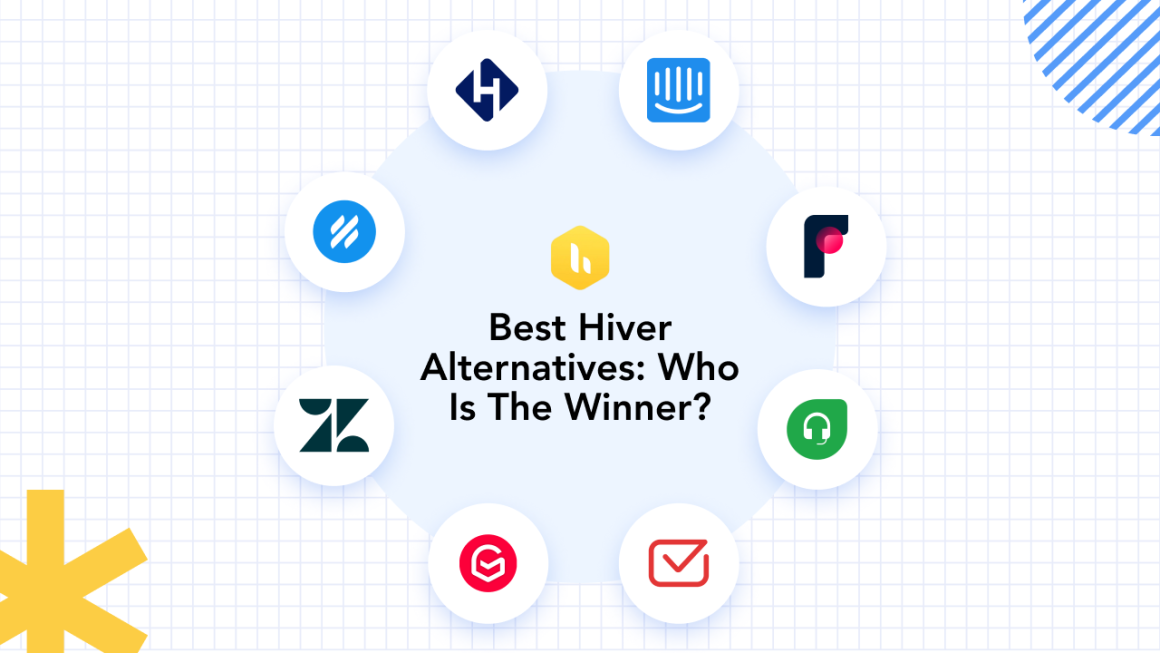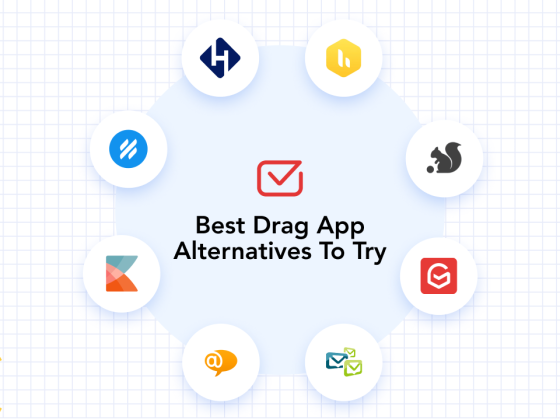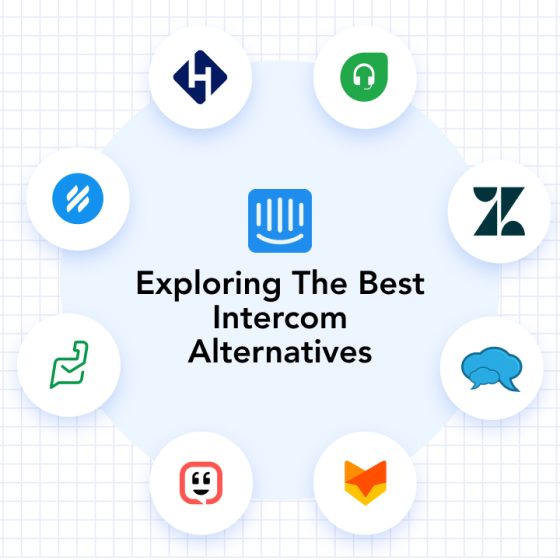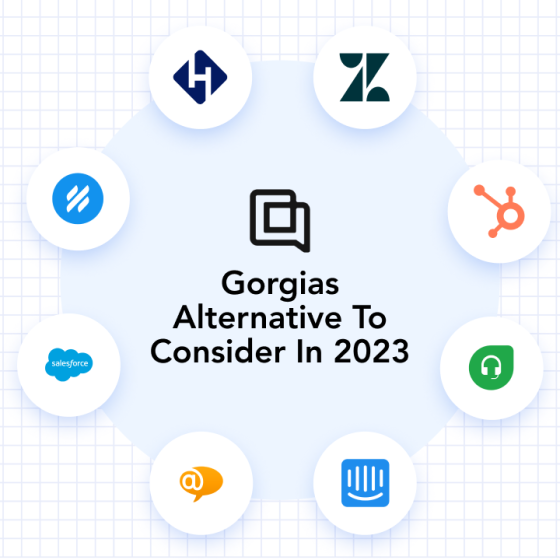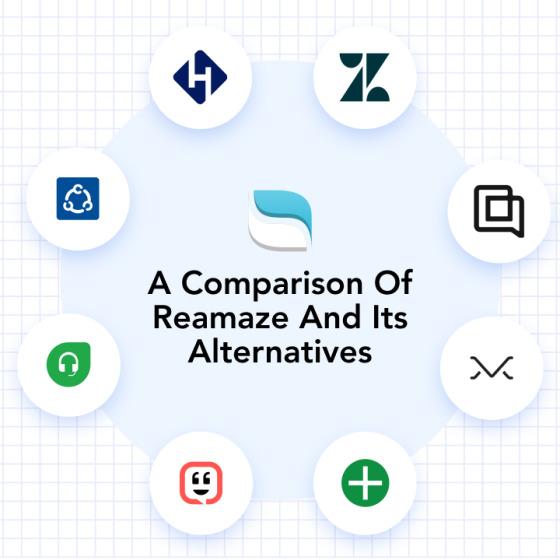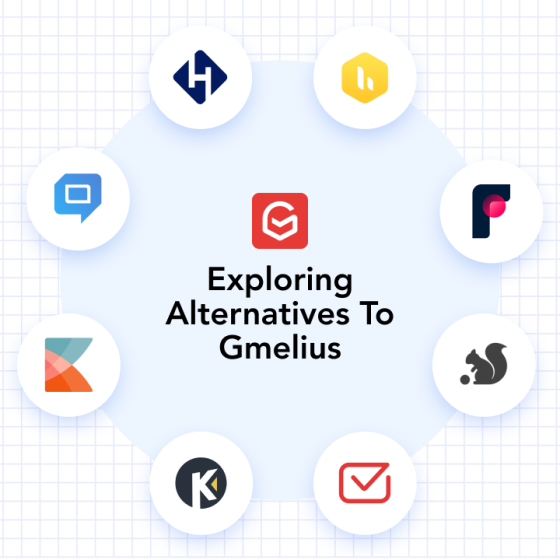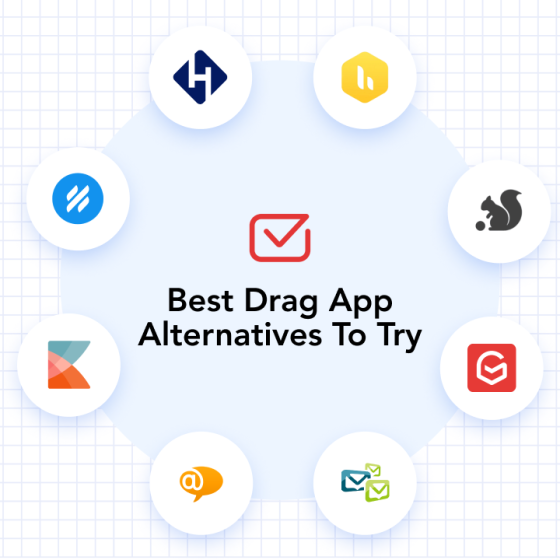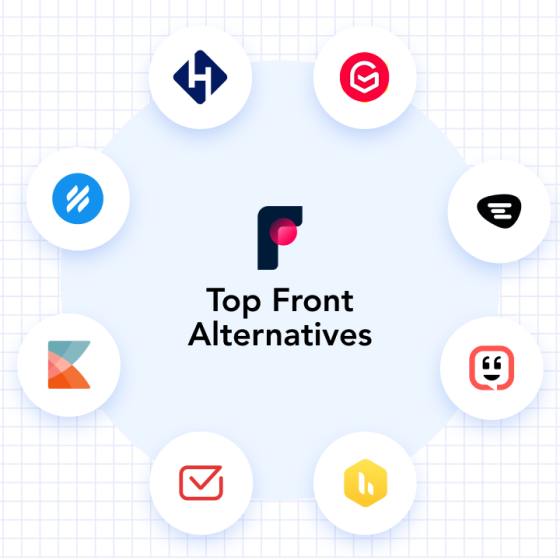Most businesses choose a shared G Suite or Microsoft mailbox for interacting with clients when first kick-starting support operations. However, they soon realize that addressing customer queries/complaints from a Gmail account is not a scalable solution.
The truth is that traditional email software are not built for customer service processes. That is where Hiver, essentially a Gmail extension, comes to the rescue.
Hiver has entered the marketplace with one major objective – to run on top of Gmail and equip support teams with added functionalities. The customer service platform works right within your Gmail inbox and offers an easy-to-use interface that your support agents are already usedto.
But there is much more than meets the eye. Though Hiver certainly has its merits, there are some shortcomings.
Why Do You Need a Hiver Alternative?
Hiver is a Gmail-only platform, meaning it will fall flat if you use any other email client. Plus, organizations will likely outgrow the Gmail-focused interface as they scale up, especially in times when customer expectations are hitting record levels.
Besides, you could find Hiver pretty glitchy. The customer support solution takes some time to load upon initial login and flash new client emails on the shared mailbox. You might have to refresh your browser tab and try again repeatedly.
Hiver’s auto-assignment is another area where it can improve. There are some customer conversations where you assign multiple support agents to handle them. Unfortunately, Hiver does not let you assign multiple agents to a conversation.
Further, Hiver costs more (paid plans starting at US$15/user/month) than dedicated platforms with more advanced features, comparable user-friendliness, and better integrations. Caution: be prepared for drastic price rises, the last being about 60%!
What do users say about Hiver?
Here is what users say about Hiver’s customer support platform:
“A minor issue is the fact that users should be aware that deleting “a single” message from a conversation in a hiver mailbox deletes the whole conversation and removes it from the Hiver mailbox when emptying the bin.” – Frank O.
“Automated rules are not available in basic plans which feels sometimes a problem.” – Akash A.
“Responses from customers are automatically assigned to the support operator who initially replied to them – it would be better to have this as an optional to either auto assign responses, or leave as unassigned (particularly useful when you have part time operators, and customers can’t wait until they’re back online)” – Karen.
This blog post rounds up a comprehensive list of the ten best Hiver alternative options to help you make a better choice.
Top Hiver Alternative Platforms
01. Helpwise
Helpwise is an excellent Hiver alternative that provides shared inboxes for email and lets you offer exceptional omnichannel support. Whether you engage with customers via texts, calls, social media, WhatsApp, or Slack, Helpwise has you covered.
Advanced query management enables you to effortlessly divide the workload among your support agents, monitor their performance in real time, and achieve inbox zero faster. Collision detection helps you avoid duplicate responses and, of course, customer frustration.
Helpwise scores high on its AI capabilities. Its intelligent chatbot take care of basic customer queries and route the complex ones to the relevant support agents. The advanced bots work 24/7. Additionally, Helpwise’s AI tools can paraphrase a specific response, summarize an entire customer conversation and even prioritize queries.
Further, you can define service-level agreements (SLA) to set accountable standards that your support agents must fulfill to ensure top-notch customer service.
Helpwise offers all these advanced functionalities without costing you a fortune. Even in its basic plan, you will get most of these features.
Pricing
Standard: US$15/user/month
Premium: US$25/user/month
Advanced: US$50/user/month
Enterprise: Custom quote on request
02. Front
Front is another leading Hiver alternative that serves as a one-stop-shop for customer service, including live chat, email, and social media. With a Gmail-inspired interface, Front offers a nearly similar feel when switching from Hiver.
Its powerful collaboration tools, like internal notes, ticket assignment, and comments, enable your support agents to manage customer conversations from a single location. You can access custom automations and predefined rule templates (locked in the higher-cost plans) to minimize manual work.
However, Front has a complex, bulky UI, resulting in missing vital customer conversations. One of its users “had difficulties in the beginning to correctly see my number of emails in my Inbox.” Plus, its search function is ineffective when you search for specific customer conversations in your inbox. You will have to waste lots of time scrolling through the huge pile of emails in the archived box.
Front’s compulsory 1-year contracts make it suitable only for deep-pocket businesses. Not to mention, its customer service platform gets expensive as you upgrade. Moreover, you need to have at least two users to unlock the features; solopreneurs have to turn to some other platform.
Pricing
Starter: US$19/user/month
Growth: US$59/user/month
Scale: US$99/user/month
Premier: US$229/user/month
03. Intercom
Intercom is a versatile, all-in-one customer service platform built to help organizations communicate with customers through multiple channels, such as live chat, email, and messaging.
Alongside its support tools, Intercom offers marketing features like automated messaging and chatbot creation, making it a robust solution for customer communication. Further, Intercom integrates with tons of enterprise tools and apps – Salesforce, WhatsApp, Stripe, Slack, Facebook, and HubSpot.
However, Intercom has attracted criticism for its clunky interface. One of its users is bothered by “Multiple options and tabs are thrown around the screen when not necessary unless for very specific reasons.”
Moreover, you cannot predict what you will pay for Intercom eventually. Its plans cost based on agent seats and people reached, does not reveal their prices, and charges additionally for dozens of add-ons.
Pricing
Starter: US$74/month
Pro: Custom quote on request
Premium: Custom quote on request
04. Drag
Drag is pretty similar to Hiver as it works on top of Gmail. The customer service solution automatically assigns customer conversations based on sender, keywords, or receiver, so every query/complaint has an owner. Additionally, your support agents can easily collaborate with one another on email drafts using @mentions.
Drag adopts a Kanban board layout to determine when your agents receive, open, and edit conversations – right through to resolution. Also, it boosts team collaboration by merging tickets.
However, Dragapp users have stated usability problems, with one saying that “there will be a new back-end update to Gmail which sometimes would cause Drag to glitch out.”
Opening a board with many tasks can be sluggish and buggy, frustrating users looking to access their tasks quickly. Besides, you cannot send new emails directly from the shared board. Instead, you need to compose an email and move it to the board.
Drag does not let you serve customers via telephony, live chat, social media, and voice, which can be a huge turnoff for growing organizations. Worse, you cannot create a knowledge base that customers can browse to clear routine queries.
So, even if Drag seems affordable initially, you are compromising on multiple valuable features.
Pricing
Starter: US$8 user/month
Plus: US$12 user/month
Pro: US$16 user/month
05. Freshdesk
Freshdesk is that Hiver alternative which is loaded with critical support-centric features. With chatbots and automated email notifications, you can deliver real-time updates to customers.
Freshdesk’s well-built ticketing system uses automation to assign and prioritize customer conversations based on requesters, keywords, or properties. You can respond to conversations faster using bulk actions and canned responses. Plus, the platform supports localization for multilingual customer service agents.
However, Freshdesk comes with a steep learning curve, especially for new users or those unfamiliar with customer service software. For example, building your first few reports and working through all the customization options could take some time.
Moreover, users have highlighted limited customization in Freshdesk’s reporting features. One user said, “when viewing agent reports, the report tells you how many tickets an agent has responded to but doesn’t have a group total.”
Furthermore, crucial support features, including custom reports, agent shifts, and skill-based routing, are available locked in the upper-tier plans. As such, brands with tight budgets wil find Freshdesk expensive.
Pricing
Free: Forever free plan
Growth: ~US$15/user/month
Pro: ~US$52/user/month
Enterprise: ~US$84/user/month
06. Gorgias
Gorgias is a customer service platform built with a narrow focus: to manage customer conversations for e-commerce vendors. Its true differentiator is its BigCommerce, Shopify, and Magento (locked in higher-tier plans) integrations.
Peeking into customers’ minds is challenging while having online interactions. Thanks to Gorgias, you can unlock this magic. An AI engine combs the web for positive or negative opinions on your offerings, then flashes the result on the app.
Besides, Gorgias provides in-built reports with extensive filters to slice the data in ways you want. For instance, its reports on revenue statistics combine ticket data from Shopify to demonstrate the revenue you have minted.
That said, Gorgias is tightly focused on e-commerce businesses. Hence, brands operating in other spaces squeeze out from its customer base.
Users have also highlighted Gorgias’ limited reporting capabilities, stating, “The reporting feature within Gorgias only allows for historical data within 90 days.” Similarly, another user “would like to have more ability to create custom reports based on the interactions our agents and customers are having within Gorgias.”
Further, Gorgias’ ticket-based pricing is unpredictable. You cannot figure out your monthly expenditure based on the ticket volume you handle every month. As you grow, you will find Gorgias’ subscriptions hurting your budget.
Pricing
Starter: US$10/month – up to 50 monthly tickets
Basic: US$60/month – up to 300 monthly tickets
Pro: US$360/month – up to 2000 monthly tickets
Advanced: US$900/month – up to 5000 monthly tickets
Enterprise: Custom quote
07. Zendesk
Zendesk is a feature-rich customer support platform used by thousands of organizations across continents. But what makes it a top Hiver alternative?
You can serve customers on the channels they love, enable them to fix their issues on their own using a help center, and personalize every interaction.
You will find automation tools, AI capabilities, and robust reporting within Zendesk’s toolkit. The help center is highly customizable, with tons of pre-made themes available in the marketplace.
With several native and third-party integrations, you can customize the Zendesk platform to build just what you need for your support team.
However, Zendesk’s hard-to-use interface has irritated users, with one complaining that “Search functionality for knowledge documentation is not optimized and the platform doesn’t make it easy to find resources.” As Zendesk follows an everything-for-everyone stance, the platform is considerably powerful but confusing, especially for businesses without in-house technical staff.
Other negative reviews have come up for Zendesk’s customer support. Various users reckon their support agents are slow to respond and provide unhelpful answers.
Further, Zendesk offers its base plan at US$69/agent/month, pretty expensive compared to other options out there. So, SMBs are already not in its customer base. Not only that, but most of the advanced features are locked in the higher-tier plans.
Pricing
Suite Team: US$69/agent/month
Suite Growth: US$115/agent/month
Suite Professional: US$149/agent/month
Suite Enterprise: Custom quote on request
08. HelpSpot
HelpSpot provides an email-centered service with a clean and simple UI that your support team can quickly get used to. Their automations and permissions are as powerful as any of its competitors.
Despite eliminating various add-ons, HelpSpot is still a step up from integrated customer support solutions as it offers advanced features, including multi-brand support, a knowledge base, and custom fields. The platform is completely customizable, so you can connect your system with the rest of your tech suite for seamless operations.
However, not all is rainbows and unicorns. HelpSpot offers limited customization, as reported by some of its users. One of them wished “more customization in reporting would be beneficial.”
Besides, HelpSpot offers only one pricing model based on the number of seats. So, the cost can get steep as more support agents join the team. Furthermore, you will not find important channels, such as live chat or built-in social media, to serve customers.
Pricing
Only on the basis of the number of agents, with the minimum being three. For instance, HelpSpot charges US$14/month for up to 20 support agents. The per-user price reduces as you onboard more support agents.
09. Gmelius
Gmelius works inside Gmail, similar to Hiver, but it pushes some features further. The customer service platform syncs Gmail labels to let you monitor support data and organize customer conversations. Plus, you can break up mailboxes and share individual conversations, labeled tickets, and even unique comment threads.
Gmelius’ highlighting point is the added project management functionality through Trello-style Kanban boards. You can convert any conversation into a task card and sort them into these visually appealing boards.
Kanban boards are customizable according to your management needs. Features like due dates and sub-tasks help you serve customers better.
However, Gmelius’ Kanban boards miss out on crucial tools, such as adding notes to these task cards, uploading files on them, and merging them when not needed. Your boards can get cluttered quite fast without these tools, leading to confusion. Worse, your support agents have to clean them up manually as they go.
Gmelius does not let you provide customer support via phone, live chat, knowledge base, which is a big letdown if you want to hit faster resolution times.
Further, critical features, including meeting reminders, mail merge, and email sequences, are locked in the higher-priced plans. For businesses running tight on budgets, upgrading to Gmelius’ upper-tier plans can be cost-prohibitive.
Pricing
Flex: US$15/user/month
Growth: US$29/user/month
Pro: US$45/user/month
10. Help Scout
Help Scout isa great Hiver alternative for lean organizations, especially those seeking a purely dedicated support platform. When you sign up for Help Scout, you can access robust customer support tools, including private notes, advanced permissions, and custom fields.
You can automate manual tasks using workflows and respond to basic queries faster with saved replies. Further, Help Scout offers Docs, an easy-to-use knowledge base builder, and Beacon, its web-embedded live chat widget, to let you deliver proactive customer support.
However, Help Scout’s limited reporting capabilities can hamper businesses’ productivity. According to one user:
“Trying to get the reports emailed and importing information to other services can be a challenge. We have had to use several means of documenting and collecting data for our customers based on what they want to hear about and see the data for.”
Other negative reviews said Help Scout lacks important integrations for calls, live chat, and Twitter.
Cosidering the Help Scout’s pricing and feature set, start-ups and small businesses can find more cost-effective options.
Pricing
Standard: US$25/user/month
Plus: US$50/user/month
Pro: US$65/user/month (billed annually only)
Comparison of Hiver Alternative Platforms
| Platform | Key Features & Pros | Pricing | Cons | Best for |
|---|---|---|---|---|
| Helpwise | Omnichannel support, unlimited SLA rules, and CSAT reports | Paid plans starting at US$15/agent/month | Slightly buggy UI No LinkedIn and Telegram support | Businesses of all sizes using Gmail or non-Gmail mailboxes |
| Front | Round-robin assignmen, tags, and internal comments | Paid plans starting at US$19/agent/month | Complex UI Mandatory annual contracts | Mid-to-large organizations looking for advanced features |
| Intercom | Intercom Messenge, duplicate detection bot, macros | Paid plans starting at US$74/agent/month | Uncertain pricing model Clunky interface | Mid-to-large organizations looking for advanced features |
| Drag | Email tracking, custom fields, and shared drafts | Paid plans starting at US$8/agent/month | Usability issues with Kanban boards No live chat and knowledge base support | Small-to-medium businesses with budgetary constraints |
| Freshdesk | Ticket dispatch, custom roles, and audit log | Paid plans starting at US$15/month | Steep learning curve Limited customization | Small-to-medium companies looking for basic features with multichannel support |
| Gorgias | Revenue statistics, chat campaigns, and intent & sentiment detection | Paid plans starting at US$10/month (up to 50 monthly tickets) | Limited reporting capabilities Only for e-commerce businesses | Small-to-medium e-commerce organizations |
| Zendesk | Prebuilt analytics dashboard, help center, and skill-based routing | Paid plans starting at US$69/agent/month | Unprofessional customer support Complicated interface | Large organizations looking for advanced features |
| HelpSpot | Canned responses, AI translation, and spam filtering | Paid plans based on the number of agents | Limited customization No live chat and social media support | Small-to-medium businesses looking for essential features |
| Gmelius | Automation rules, email sequences, and assignments | Paid plans starting at US$15/agent/month | Kanban boards lack important features No live chat, phone, and knowledge base support | Small-to-medium companies looking for Gmail-like UI with advanced features |
| Help Scout | Beacon help widget, custom reports, and restricted docs | Paid plans starting at US$25/agent/month | No call, live chat, and Twitter integrations Limited reporting capabilities | Small-to-medium businesses looking for basic functionalities |
Which is the Best Hiver Alternative?
The final decision boils down to which customer support functionalities matter to you.
Help Scout and Drag are good options if you want a cost-effective customer service solution with a simple interface. If you do not leave your Gmail account without compromising on features, go with Gmelius and Front.
Zendesk and Intercom are perfect picks if you want advanced automation and reporting capabilities and have deep pockets.
Finally, Gorgias fits well into your strategy if you run an e-commerce store.
What if you find a customer support platform that ticks all these boxes? Introducing Helpwise, an all-in-one solution for boosting customer satisfaction and agent productivity.
Helpwise lets you impress customers by being available on their channel of choice, including WhatsApp, live chat, email, call, and SMS. What is more, it routes customer conversations to suitable agents based on automation rules and logic for faster resolution. It also has impressive AI features to reduce your and your agents workload.
For instance, you can build a database of saved replies to resolve routine customer queries faster. Plus, you can develop a help center of frequently asked questions (FAQ) and articles/blogs where customers can get their queries resolved themselves.
Furthermore, you can build reports with custom filters like agents, dates, channels, and tags to dig deep into your support strategies.
Sounds interesting? Sign up for a 14-day free trial to know more.
FAQs
What are some alternatives to using Hiver for email collaboration?
Some of the best Hiver alternatives for email collaboration include Helpwise, Front, Intercom, and Zendesk.
Helpwise particularly scores higher in this area. For instance, collision detection prevents duplicate responses and notifies agents if they are addressing the same conversation. Likewise, your agents can access resources from a centralized location to resolve tickets faster and more effectively.
Are there any free alternatives to Hiver?
Among Hiver alternatives, Freshdesk and Drag offer free plans for businesses with tight budgets. That said, you will outgrow the features offered in these plans as soon as you expand. Plus, these two customer support platforms do not offer good pricing-to-feature ratios.
Helpwise, on the other hand, offers advanced support functionalities in its basic plan itself like saved replies, rule-based automations, and shared drafts. All these at just US$15/agent/month.
Can you recommend any Hiver alternatives that offer similar features?
While most Hiver alternatives offer similar features, Helpwise goes a step further by focusing more on customer-centricity. Case in point, deep integrations with popular tools, AI-enabled capabilities (rephrasing, summarizing, and priortization), and robust CSAT reporting.
Do Hiver alternatives integrate with popular email platforms like Gmail or Outlook?
Most Hiver alternatives offer native and third-party integrations with leading email platforms like Gmail and Outlook. However, those integrations either hamper the UI with periodic updates or are locked in the upper-tier plans.
Fortunately, Helpwise offers deep integrations with these email platforms without needing to upgrade the subscriptions.
Are there any Hiver alternatives that are specifically designed for team collaboration?
Almost every Hiver alternative designs its customer support platform keeping team collaboration in mind. But Helpwise outshines these solutions by offering dozens of collaboration features, including balance workload, advanced auto-assignment, centralized communication, and collision detection. With such a feature-rich platform, your team collaboration will surely improve.
